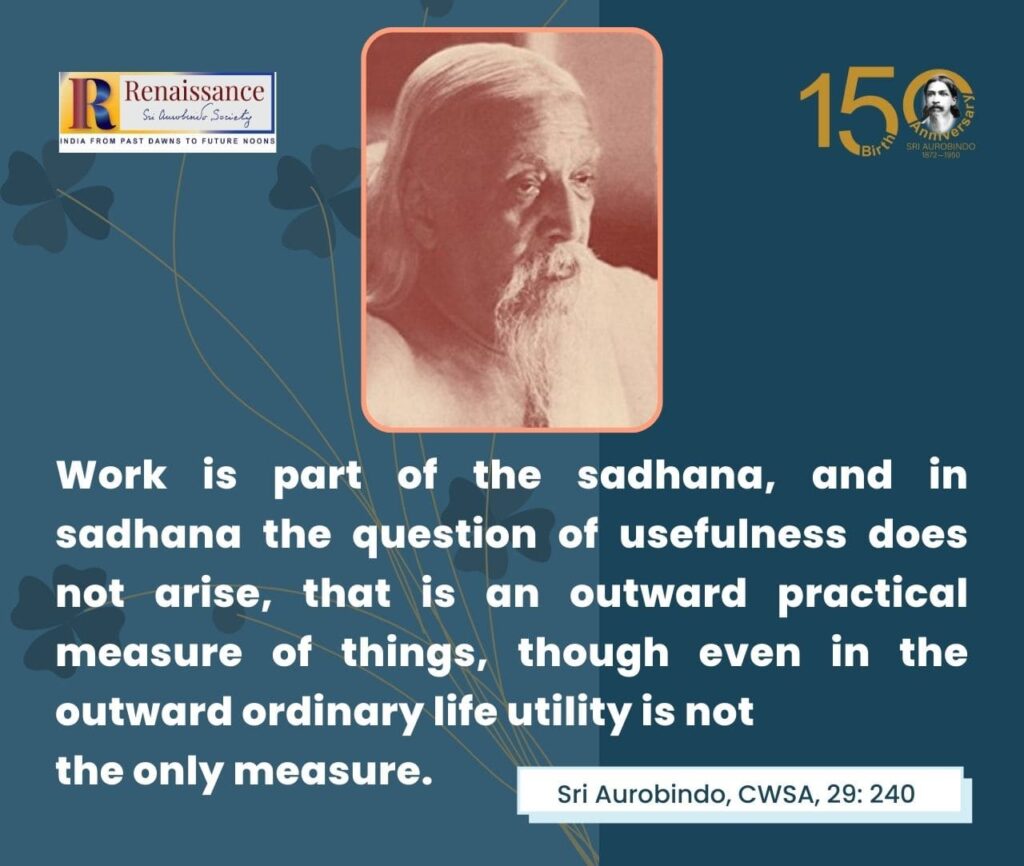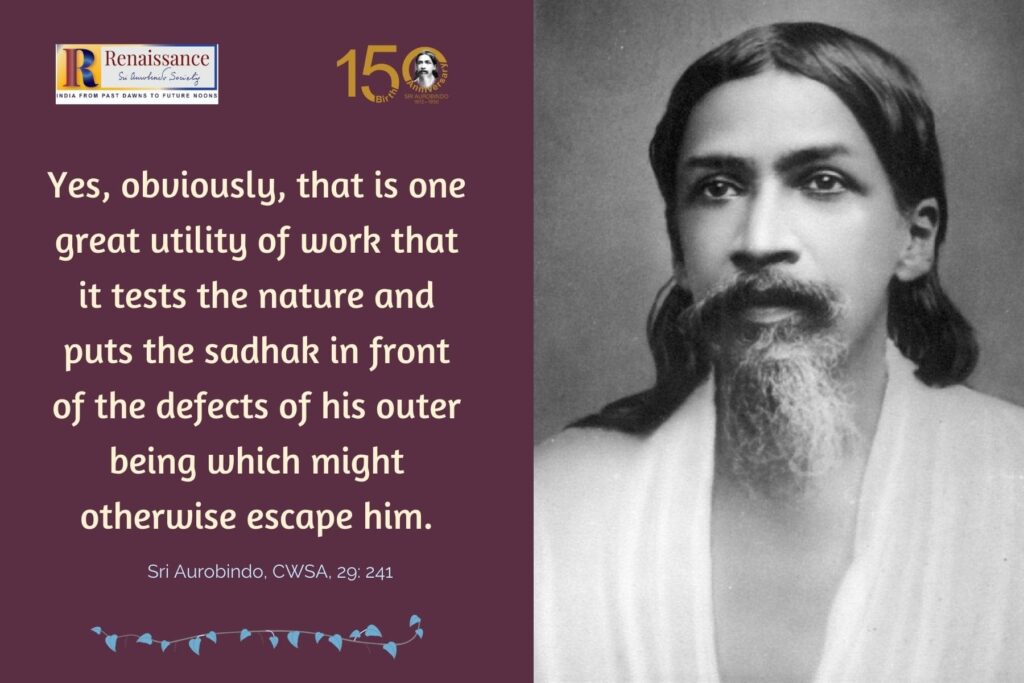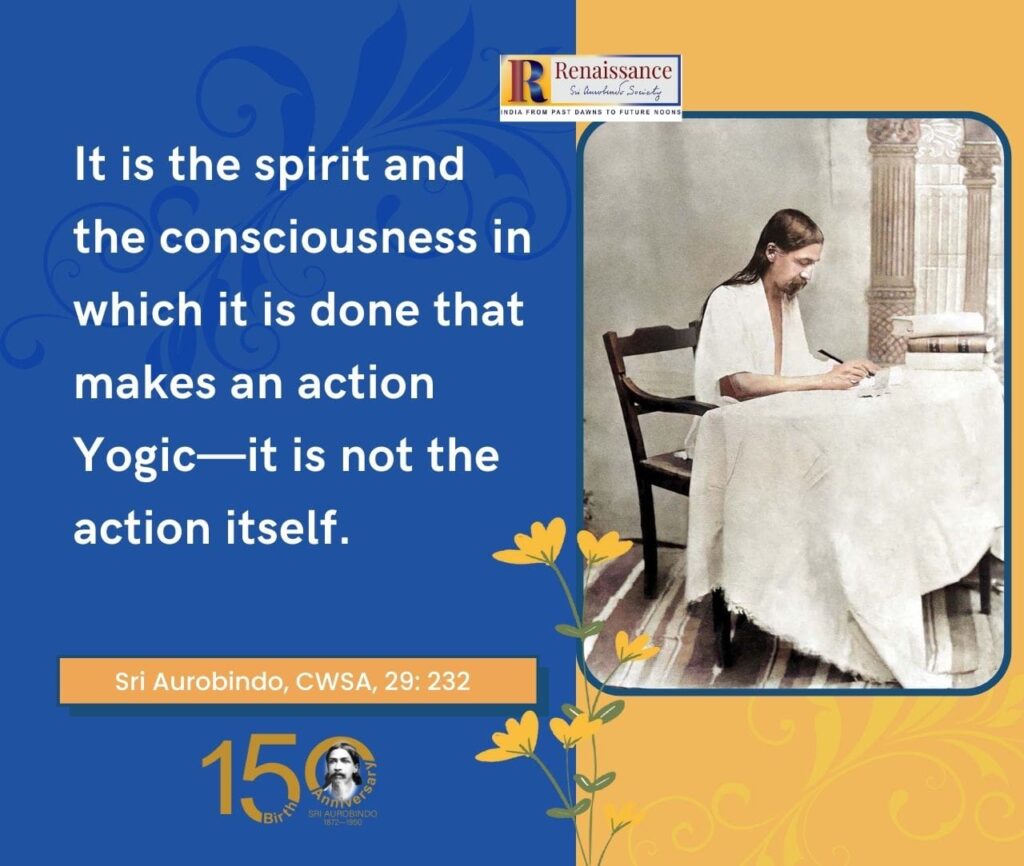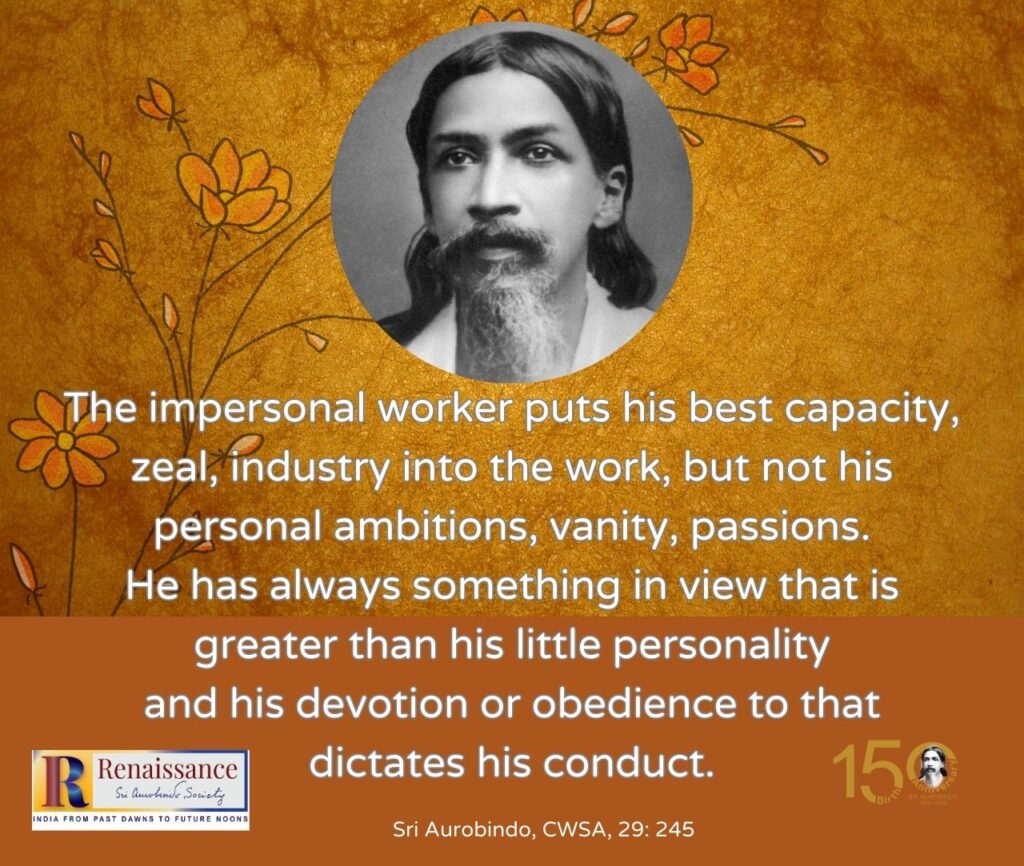Editor’s note: We feature selections from Sri Aurobindo’s Letters on Yoga, which speak of the usefulness of work for development of consciousness. Also, he gives us some great practical guidance on developing the right attitude in work when offered as service to the Divine.

The Utility of Work
To keep up work helps to keep up the balance between the internal experience and the external development; otherwise one-sidedness and want of measure and balance may develop. Moreover, it is necessary to keep the sadhana of work for the Divine, because in the end that enables the sadhak to bring out the inner progress into the external nature and life and helps the integrality of the sadhana.
***
It is not at all a question of usefulness—although your work is very useful when you put yourself into it. Work is part of the sadhana, and in sadhana the question of usefulness does not arise, that is an outward practical measure of things, though even in the outward ordinary life utility is not the only measure.
The question is of aspiration to the Divine, whether that is your central aim in life, your inner need or not. Sadhana for oneself is another matter—one can take it up or leave it. The real sadhana is for the Divine—it is the soul’s need and one cannot give it up even if in moments of despondency one thinks one can. [. . .]
***

***
Yes, obviously, that is one great utility of work that it tests the nature and puts the sadhak in front of the defects of his outer being which might otherwise escape him.
***
It will be better to do the work as a sadhana for getting rid of the defects rather than accept the defects as a reason for not doing the work. Instead of accepting these reactions as if they were an unchangeable law of your nature, you should make up your mind that they must come no longer—calling down the aid of the Mother’s force to purify the vital and eliminate them altogether.
If you believe that the trouble in the body must come, naturally it will come; rather fix in your mind the idea and will that it must not come and will not come. If it tries to come reject it and throw it away from you. [. . .]
***
For the sadhak outward struggles, troubles, calamities are only a means of surmounting ego and rajasic desire and attaining to complete surrender. So long as one insists on success, one is doing the work partly at least for the ego; difficulties and outward failures come to warn one that it is so and to bring complete equality.
This does not mean that the power of victory is not to be acquired; but it is not success in the immediate work that is all-important; it is the power to receive and transmit a greater and greater correct vision and inner Force that has to be developed and this must be done quite coolly and patiently without being elated or disturbed by immediate victory or failure.

***
Also read:
The Mother’s Words: “I make no difference between work and yoga.”
Right Attitude in Work
The spiritual effectivity of work of course depends on the inner attitude. What is important is the spirit of offering put into the work. If one can in addition remember the Mother in the work or through a certain concentration feel the Mother’s presence or force sustaining or doing the work, that carries the spiritual effectivity still farther.
But even if one cannot in moments of clouding, depression or struggle do these things, yet there can be behind a love or bhakti which was the original motive power of the work and that can remain behind the cloud and reemerge like the sun after dark periods.
All sadhana is like that and it is why one should not be discouraged by the dark moments, but realise that the original urge is there and that therefore the dark moments are only an episode in the journey which will lead to greater progress when they are once over.
***
As for the work, it is a means of preparation, it can also be a means of growing into the inner consciousness.
But then it must be done not as work only but as an offering to the Mother, without insisting on the ego, with an aspiration to feel her Force working in one, her Presence presiding over the work, seeking to give all to her, not claiming anything for oneself. That is the spirit of work offered as a sacrifice; done like that, work becomes a sadhana and a Yoga.

***
What you have to realise is that your success or failure depends, first and always, on your keeping in the right attitude and in the true psychic and spiritual atmosphere and allowing the Mother’s force to act through you.
If I can judge from your letters, you take its support too much for granted and lay the first stress on your own ideas and plans and words about the work; but these whether good or bad, right or mistaken, are bound to fail if they are not instruments of the true Force. You have to be always concentrated, always referring all difficulties for solution to the force that is being sent from here, always letting it act and not substituting your own mind and separate vital will or impulse.
Proceed with your work, never forgetting the condition of success. Do not lose yourself in the work or in your ideas or plans or forget to keep yourself in constant touch with the true source. Do not allow anybody’s mind or vital influence or the influence of the surrounding atmosphere or the ordinary human mentality to come between you and the power and presence of the Mother. [. . .]

***
Equanimity in Work
Helpless acceptance [of difficulties] is no part of the Yoga of works—what is necessary is a calm equanimity in the face both of helpful and adverse, fortunate or unfortunate happenings, good or evil fortune, success or failure of effort. One must learn to bear without flinching and disturbance, without rajasic joy or grief, doing all that is necessary, but not dejected if difficulties or failure come—one still goes on doing what can be done, not sinking under the burden of life. [. . .]
***
This is the right inner attitude, of equality—to remain unmoved whatever may outwardly happen.
But what is needed for success in the outward field (if you do not use human means, diplomacy or tactics) is the power to transmit calmly a Force that can change men’s attitude and the circumstances and make any outward action taken at once the right thing to do and effective.
***
You have to make yourself an instrument of the invisible Force—to be able in a way to direct it to the required point and for the required purpose. But for that samata must be entire—for a calm and luminous use of the Force is necessary. Otherwise the use of the Force, if accompanied by ego-reactions, may raise a corresponding ego-resistance and a struggle. [. . .]
The Impersonal Worker
To be impersonal, generally, is not to be ego-centric, not to regard things from the point of view of how they affect oneself,—but to see what things are in themselves, to judge impartially, to do what is demanded by the purpose of things or by the will of the Master of things, not by one’s own personal point of view or egoistic interest or ego-formed idea or feeling.
In work it is to do what is best for the work, without regard to one’s own prestige or convenience, not to regard the work as one’s own but as the Mother’s, to do it according to rule, discipline, impersonal arrangement, even if conditions are not favourable to do the best according to the conditions etc. etc.
The impersonal worker puts his best capacity, zeal, industry into the work, but not his personal ambitions, vanity, passions. He has always something in view that is greater than his little personality and his devotion or obedience to that dictates his conduct.

***
Your difficulty in work is that you regard it too much as your work and from your personal point of view. So questions of personal convenience, ideas, way of doing things, prestige, demands take a big place—and the result is quarrels.
You have to learn to be impersonal. Even in the world work cannot be well done without that. How much more necessary is it for a sadhak of Yoga!
***
Service of the Divine
There should be no straining after power, no ambition, no egoism of power. The power or powers that come should be considered not as one’s own, but as gifts of the Divine for the Divine’s purpose.
Care should be taken that there should be no ambitious or selfish misuse, no pride or vanity, no sense of superiority, no claim or egoism of the instrument, only a simple and pure psychic instrumentation of the nature in any way in which it is fit for the service of the Divine. ]. . .]
***
[. . .] Vital power is necessary for work . . . Of course, to make a full Yogic use of it and of its force for action, the ego must gradually fade out and vital attachments and impulses be replaced by the spiritual motive. Bhakti, devotion to the Divine, and the spirit of service to the Divine are among the most powerful means for this change.
***
Reading and study though they can be useful for preparing the mind, are not themselves the best means of entering the Yoga. It is self-dedication from within that is the means.
It is with the consciousness of the Mother that you must unite, a sincere self-consecration in the mind and heart and the Will is the means for it. The work given by the Mother is always meant as field for that self-consecration, it has to be done as an offering to her so that through the self-offering one may come to feel her force acting and her presence.
***
If one went to the Himalayas, the likelihood is that one would make oneself fit for inactive meditation and quite unfit for life and the Mother’s service—so in the next life the character would be like that.
This is simply the influence of old ideas that have no application in this Yoga. It is here in the life near the Mother, in the work itself that one must become fit to be a perfect instrument of the Mother.

~ Design: Beloo Mehra



